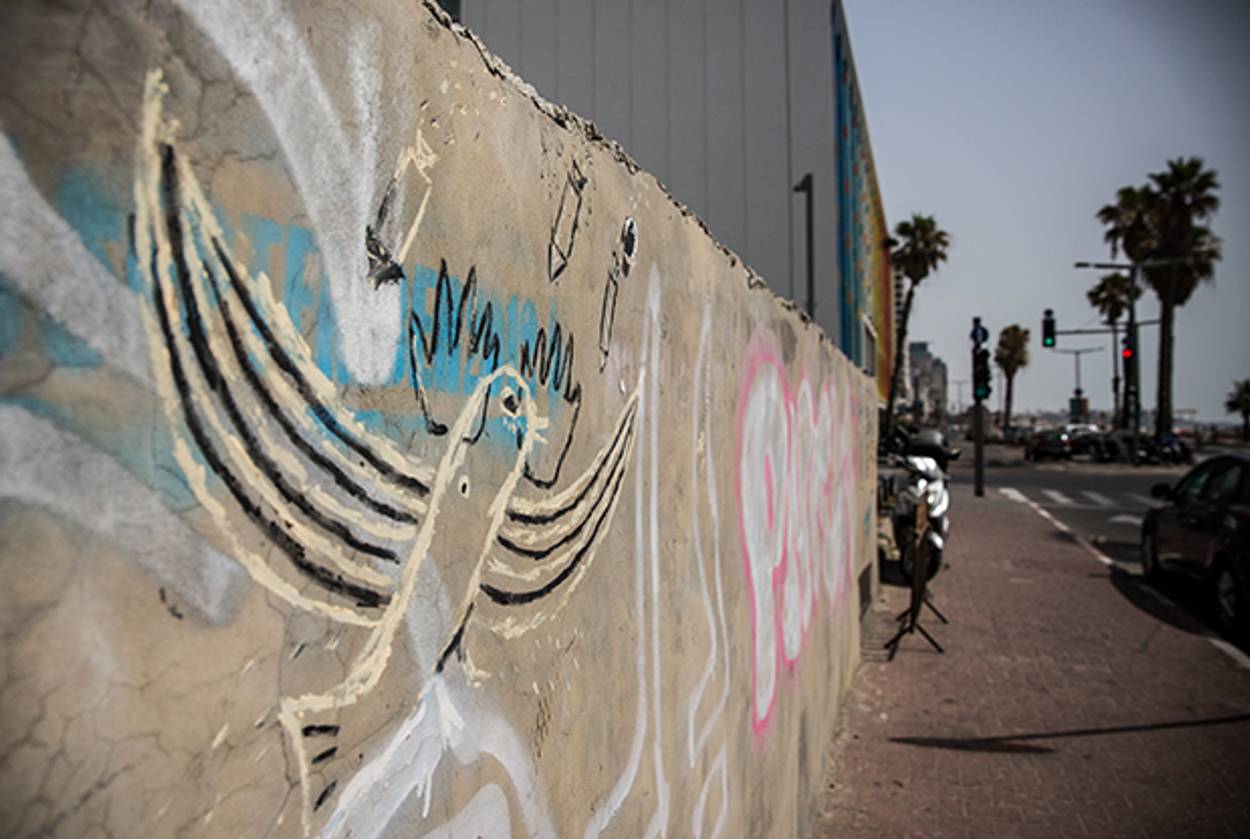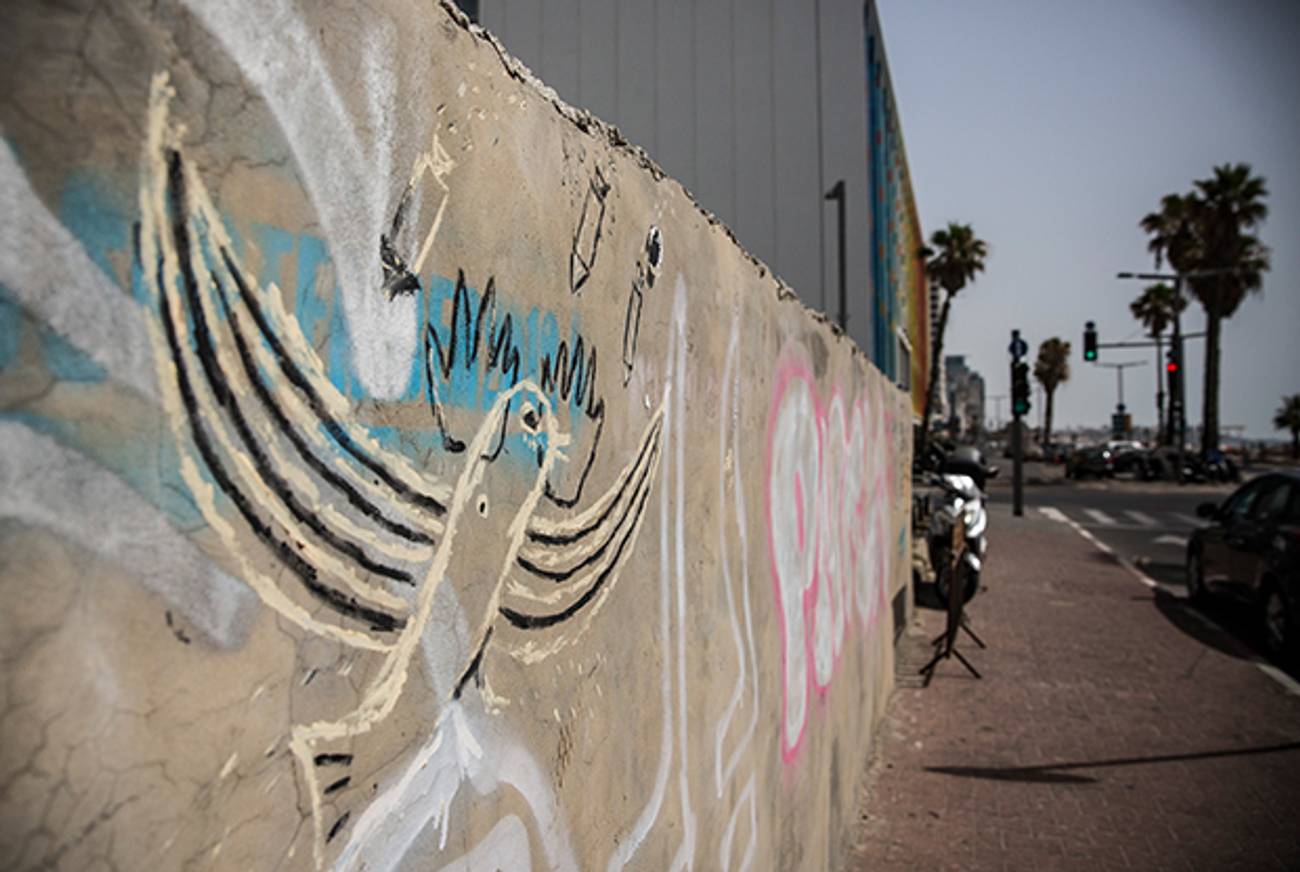For Young Americans in Tel Aviv, an Uneasy Summer
Sirens, bomb shelters, and the occasional selfie as Gaza conflict escalates




The start of last week’s Operation Protective Edge and the threat of rocket fire directed toward Tel Aviv have cast a surreal pallor over the young Americans spending their summers in the coastal Israeli city. The mood is complex: alternately tense, frightened, anxious, optimistic, adrenaline-pumped, political, apathetic, homesick, Zionist, militaristic, and pacifist. A few have returned to the States, some are on the fence, others are soothing the worried cries of their Jewish mothers, and still others are embracing Zionism and Israel with newfound fervor.
Gathering with friends after the workday now includes discussing where you were when the sirens sounded, if you heard the boom, and constant praise for the Iron Dome. Our various programs regularly express concern for our safety, explaining (even before this flare-up) where the dorm’s bomb shelters are and how to use them.
Our inboxes are flooded with reassuring emails, and our support staff is a resource for emotional and moral support. They’ve arranged drills from the bus (which included lying face down in garbage by the side of the road) and have taught us to see everything as a possible source of shelter. A few adjustments notwithstanding, life is peculiarly normal.
Taking cues from the Israelis, we remain calm, collected—and utterly addicted to our smartphones. If you were to want to cure twenty-somethings of “blue screen syndrome” and unstick them from social media, you’d have to come up with something more potent than the threat of Hamas rocket fire. It’s almost as if the conflict exists solely on the internet.
We look down to our phones, rather than up toward the sky, to see if a rocket is coming our way. We share op-eds and live blogs with each other on Facebook and Twitter. We take videos of the sirens as we walk briskly to the protected areas in our dorms or workplaces. We make anxious, immature jokes about farting in the shelter. We take selfies. We text and reassure our family and friends back home. I use “we” deliberately because there is deep sense of community that has coalesced out of the time spent together in the shelters—a metaphorical and literal “safe space.”
But the constant stream of information isn’t always a comfort. Many have an app that tracks every rocket launch in the country—not always remembering that the deadlier mortars that can hit Sderot cannot hit Tel Aviv—and become fearful. Many find themselves suddenly engulfed by the 24-hour news cycle with an incomplete background on the infinitely complex situation here, which takes years (if not a lifetime) to understand.
The leftists among us who also sympathize with Palestinians and advocate an end to the occupation feel the need to keep quiet for fear of sounding insensitive. You might say there are no JStreeters in a bomb shelter. It’s extremely challenging—yet still critical—to keep the sufferings of innocent Palestinians in mind even while a Hamas rocket hurtles in your direction. But the most frightening thing this past week was overhearing some American students making racist and near-genocidal comments about Palestinians in Gaza.
I “air dirty laundry” not to demonize my friends, but, as the kidnappings and murders of Naftali, Gilad, Eyal, and Muhammad show, nobody is immune from the hatred that war and conflict can spawn—not Palestinians, not Israelis, not the French, and not young American Jews. But there are also joint demonstrations of Jews and Arabs chanting “We Refuse to be Enemies,” proving that even conflict can foster mutual understanding, community, and compassion. And like hatred, nobody is immune to that either. We young American Jews have been dragged into this conflict not simply by living in an Israel under fire, but by being subject to the paradox of a conflict that creates both hostility and community. We can only hope that the latter prevails.
Max Daniel is a recent graduate of Columbia University and the Jewish Theological Seminary. He is currently participating in the Jewish Agency’s Onward Israel program.
Previous: Fighting Resumes After Brief Israeli Ceasefire
A Look at Israeli Life Just Outside the Gaza Strip
Max Daniel is a recent graduate of Columbia University and the Jewish Theological Seminary. He is currently participating in the Jewish Agency’s Onward Israel program.